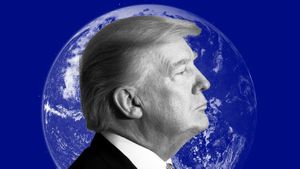The Middle East is once again caught in the throes of tension, with the specter of nuclear escalation looming over the region. The atmosphere is charged, as hostilities between Iran and Israel threaten to spark wider conflicts. Many observers are nervously eyeing the political climate, particularly with the potential return of Donald Trump as United States President, which introduces unpredictable dynamics to the already tenuous situation.
Trump's presidency, characterized by his controversial withdrawal from the 2015 Iran Nuclear Deal and the imposition of intensified sanctions on Tehran, has left deep scars. The situation escalated dramatically when Trump authorized the assassination of Iranian General Qassem Soleimani in January 2020, during his tenure. Soleimani, the leader of Iran’s elite Quds Force, played a strategic role within Iran’s military operations, directly answering to the Supreme Leader, Ayatollah Ali Khamenei.
Iran's animosity toward Trump is palpable, particularly since he has positioned himself as a staunch ally of Israel and its Prime Minister, Benjamin Netanyahu. This past October, Israel faced attacks from Iran-backed groups, leading to heightened calls for military action. While campaigning, Trump remarked on the possibility of Israel targeting Iranian nuclear facilities, emphasizing how such aggressive posturing might reshape Iran’s nuclear strategy.
Concerns simmering within diplomatic circles suggest Trump’s return could prompt Iran to pursue nuclear weapons as a means of deterrence against perceived aggressions from the West. Iran is still grappling with the fallout of previous Israeli assaults on its regional proxies, including Hamas and Hezbollah. Beyond mere borders, these conflicts have deeply influenced Iran’s security calculations.
So what's holding Tehran back from advancing its nuclear ambitions? Surprisingly, it's not just U.S. pressure or threats from Israel. The internal politics of Iran, particularly the strong stance of Supreme Leader Ali Khamenei, plays a pivotal role. Khamenei had previously issued a Fatwa outlawing nuclear weapons, reinforcing this message as recently as 2019. He stated unequivocally using nuclear arms is "Haram"—forbidden under Islamic law.
Yet, the tone from Tehran is changing. Khamenei's rhetoric has escalated alongside regional tensions, particularly with recent conflicts involving Israel. For example, on November 2, Khamenei expressed his intent to respond fiercely to aggression from Israel and the U.S., hinting at more aggressive military postures.
Should Iran ever perceive its existence to be under serious threat, there are indications it might reconsider its nuclear doctrine. A senior adviser to Khamenei, Kamal Kharrazi, underscored this stance during a recent interview, stating, "If there is an existential threat, we will change our approach to nuclear weapons." Meanwhile, Iran continues to enrich uranium, edging closer to the technical capacity required for weapons-grade material—perhaps without fully committing to developing nuclear arms.
The timeline for Iran's potential nuclear capability varies widely depending on whom you ask. CIA Director William Burns noted as recently as October 2024, Iran could theoretically amass enough fissile material for one atomic bomb within a week if it made the decision to do so, though he insisted there is currently no evidence Iran has embarked on such endeavors. U.S. Secretary of State Antony Blinken echoed similar concerns, cautioning the situation remains fluid.
On the ground, many analysts predict Iran could be capable of producing several nuclear bombs within short timeframes, provided drastic changes occur policy-wise or politically. Interestingly, some estimates suggest Tehran has reached up to 60% uranium enrichment, just shy of the level needed for nuclear weapons, indicating how advanced they are in nuclear technology.
The military and strategic decisions of the U.S. and Israel loom large over Iran’s calculations. Both nations have stated they will not allow Iran to acquire nuclear weapons,with Netanyahu asserting his military has one primary goal: to prevent Iran from achieving nuclear capability at any costs. Yet, some analysts warn such threats may only augment Iran's resolve to hasten its nuclear program as deterrence against invasion.
Historically, Israel has demonstrated a propensity for preemptive strikes against perceived nuclear threats, as evident from its operations against Iraq and Syria. Nevertheless, Iran's nuclear infrastructure is more dispersed, which complicates any potential military response. Many facilities are heavily fortified, implying airstrikes may not suffice to dismantle Iran's nuclear ambitions effectively.
On the Iranian front, there exists a spectrum of opinions on what Trump’s presidency might usher. Some fear it could herald open warfare with the U.S. Others cautiously hope for diplomatic engagements reminiscent of Trump’s surprising overtures to North Korea. What remains certain is the palpable sense of impending change within U.S.-Iran relations.
The stakes are undoubtedly high, with the potential for miscalculations leading to catastrophic outcomes. Analysts and world leaders continuously discuss strategies to curb Iran’s nuclear ambitions, yet the possibility of military escalation remains ever present. Trump’s return could be the catalyst for significant shifts, whether for peace agreements or fast-tracking conflicts.



